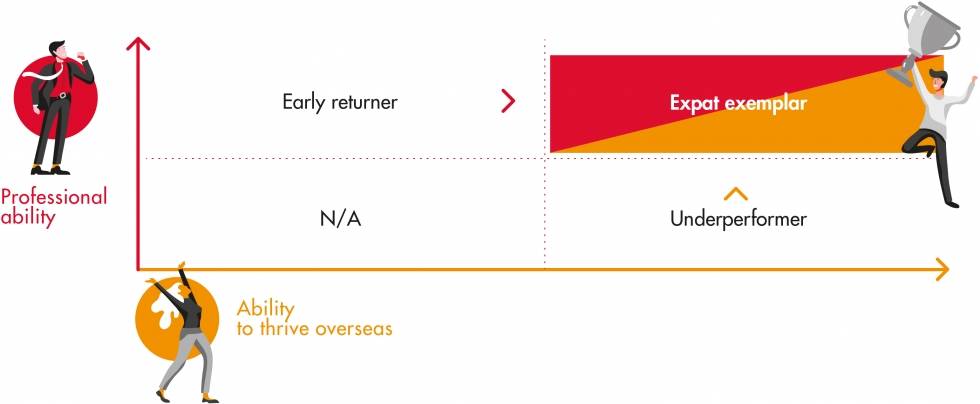How to turn an imperfect candidate into the perfect expat

One of the key factors in the success of an overseas assignment is choosing the right candidate in the first place.
Companies have different ways of choosing, whether it is based on the intuition of experienced global mobility teams or, more recently, by using various software tools that remove the inevitable cognitive bias and automatically (in theory, at least) identify the candidate most likely to succeed.
But however you go about it, you are really balancing two factors: their ability to do the job and their ability to be successful as an expat.
Professional skills vs. expat ability
Each assignment has a specific business objective. For this, a certain set of skills and experience will be required of the perfect candidate. But if you want the assignment to be successful, a candidate will also need certain personality traits to flourish in the demanding and unusual situations of working overseas.
This is less clear cut. What does it take to be a successful expat? They require a number of intellectual, psychological and social skills. They need to be adventurous, unflappable, sociable, culturally aware, flexible and open-minded. Not only that, but the family unit that accompanies them needs to have a similar mindset. (It is well-known that family upsets are a common cause of expat failure, so be prepared to help them out.)
It can be helpful for global mobility departments to consider this key balancing act, and what they can do to get it right. This balance can even be visualized by mapping the two dimensions together:

Early returner vs. underperformer
If you select a candidate who has the perfect professional CV, but who lacks the personality to thrive in a new and strange cultural environment, there is a higher chance of early repatriation: these are the “early returners”. They can do the job perfectly, but struggle in a strange and new environment.
The flip side is a candidate whose personality is ideally suited to the often trying circumstances of an overseas assignment, but who is perhaps less skilled professionally. You’re confident they and their family will get on fine – but they bring less experience or an imperfect skillset to the role. In essence, there is a greater risk that the professional objectives may not be met - these are the potential “underperformers”.

How to get the perfect blend
In an ideal world, you would find all the necessary skills in a single candidate, but that is often not the case. Your candidate pool is far more likely to be full of potential “underperformers” or “early returners”, and you are left wondering which is the lesser of two evils. But more useful question to answer would be to ask how you can convert them into the perfect expat or “expat exemplar”.
A potential “underperformer” will need to supplement their business skills – and this will of course be different for every candidate and every assignment. It is also the task of a business or line manager to make this assessment and suggest a course of action to bring them up to standard. Can the shortfall be addressed with training? Can mentors help? Can the objective be revised?
Adding expat skills
The challenge of helping a perfectly qualified candidate to thrive overseas is, however, the job of the global mobility department. Your department will have overseen many assignments, and you will know from experience what kinds of people thrive best - and will be able to support and advise first-time expats accordingly.
Mentoring can be very helpful too. You will have records of previous assigness, who are typically happy to pass on advice. By putting expats in touch with those who have previously been to the same places, you will significantly increase their chances of settling.

Increasingly, companies also work closely with FAIM-certified relocation partners to ensure that assignees have the greatest possible chance of success – through a combination of giving them the necessary skills and removing the obstacles that might lead to assignment failure. Because the FAIM certification goes far beyond simply moving household goods, your FIDI partner can advise on broader issues that will help you convert the potential “early returner” into the “expat exemplar”. For example:
- Cultural training – making expats aware of the cultural differences in their new host country
- Language training – recommending local resources to help expats get to grips with the language
- Planning – helping remove anxiety by helping with assignment planning, from accommodation finding to school searches,
- Problem resolution – when problems do arise, providing local knowledge and support
By working together with local resources, you can increase the chances of assignment success. If your candidate is the perfect person for the job, but you fear they may not make the perfect expat, there is a lot that you and your FIDI partner can do to change the situation – and increase the chance of a successful outcome.



